A typical Irish wedding is noted for many things. Examples include rain, a nervous Best Man, Bridesmaids clamouring to get in front of the camera first, lots of alcoholic beverages, rich food, a wedding band/DJ that half the crowd doesn't like and great craic! Occasionally, the role of the Irish wedding blessing is lost amidst all of the above yet it is a crucial part of the marriage tradition. In this piece, we will look at the origins and meaning of two popular blessings and also investigate the history of the wedding toast.
May The Road Rise Up To Meet You
May the road rise to meet you.
May the wind be always at your back.
May the sun shine warm upon your face,
the rain fall soft upon your fields.
And until we meet again,
may God hold you in the palm of his hand.
Origins
This beautiful piece of writing is arguably the most loved Irish wedding blessing and comes from the Gaelic phrase "Go n-éiri an bóthar leat," which means ‘may your journey be successful.’ Given the popularity of the expression, it is incredible to think that no one knows precisely where the saying came from or who said it.

Some historians have attributed "May The Road Rise Up To Meet You" to Ireland's Saint Patrick!
This particular Irish Wedding Blessing has been handed down from generation to generation for such a long time that its exact origins are unknown. As a consequence, there is an element of ‘guesswork’ involved here, but most scholars are sure it originated in Ireland and possibly from the Ancient Celts.
However, certain historians have tried to attribute 'May The Road Rise Up To Meet You' to St. Patrick. It is not an outrageous suggestion as the blessing does seem to mesh nicely with his writing style. If you go through his other work (PDF Link), you’ll notice that Ireland’s patron saint liked to invoke nature in his writing. This particular Irish Blessing mentions the wind, sun, and rain and of course it asks God to look after you. Compare it with his other work and there appear to be parallels. However, no one can definitively give Saint Patrick credit.
More cynical researchers suggest the saying is little more than a marketing tool to generate tourism revenue! Our inability to pinpoint the source means there will always be different interpretations.
Meaning
If you’ve ever been to an Irish wedding, you’re likely to have heard this blessing. It begins by hoping your journey isn’t too difficult and that you don’t have a vast array of obstacles to overcome. The parts above related to nature could refer to the protection God will offer you:
- Wind: Could possibly mean God’s spirit.
- Sun: Refers to His warmth and the comfort of His protection.
- Rain: It is soft and gentle and necessary for growth.
The final part “May God hold you in the palm of his hand” needs little explanation.
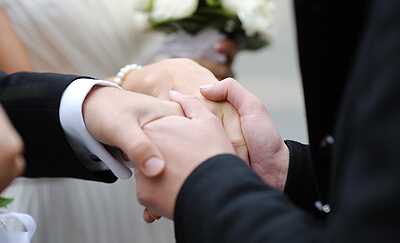
In Irish wedding tradition, the father of the bride gives his ‘blessing’ to the groom and the union.
You can easily see how it makes a lovely prayer but how does this thought provoking piece of writing work as an Irish wedding blessing?
In Irish wedding tradition, the father of the bride gives his ‘blessing’ to the groom. This means he approves of the union. The importance of a patriarch’s blessing goes right back to at least the age of the Celts. This ‘blessing’ could be for a number of reasons (not necessarily a wedding) and was given to various people; family members, friends and even strangers.
You could say that this Irish wedding blessing works in two ways; it is another way for the father of the bride to give his blessing, and it also gives God’s blessing to the marriage.
Happy Is The Bride That Rain Fell Upon
Happy is the bride that rain falls on
May your mornings bring joy and your evenings bring peace.
May your troubles grow few as your blessings increase.
May the saddest day of your future
Be no worse than the happiest day of your past.
May your hands be forever clasped in friendship
And your hearts joined forever in love.
Your lives are very special,
God has touched you in many ways.
May his blessings rest upon you
And fill all your coming days.
We swear by peace and love to stand,
Heart to heart and hand to hand.
Hark, O Spirit, and hear us now,
Confirming this our Sacred Vow.
Countless Irish brides are reading this and shaking their heads in disbelief! You might be aware of the fact that it does occasionally rain in Ireland. You’ll also notice that most weddings take place during the summer months as this period is the only time when there is a decent chance of it NOT raining!
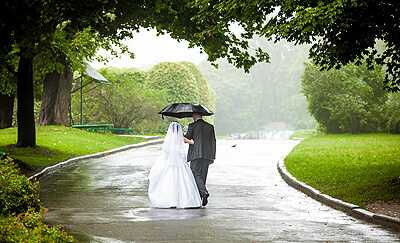
If it rains on a bride’s wedding day, she will shed a tear for every drop of rain that falls!
This is yet another Irish wedding blessing that has its origins shrouded in mystery. There are different variations including one that isn’t exactly cheery! It suggests that if it rains on a bride’s wedding day, she will shed a tear for every drop of rain that falls!
This blessing probably comes from the superstition that your marriage would not be a happy one if it rained on your wedding day. Many years ago, it was a serious matter if it rained on the big day because there were no umbrellas or awnings to keep everyone dry. As we mentioned above, raindrops symbolised tears and a wet wedding was a sign of upcoming sorrow. If this were actually true, very few Irish people would ever get hitched!
The meaning of this Irish wedding blessing is pretty straightforward and simply wishes the couple the very best during their journey. There is probably an element of Irish wit involved too; as if Irish people know it is almost inevitable that it will rain. Cue the rush to get the wedding photos done before thousands of euro worth of fine clothing gets ruined!
History of the Wedding Toast
An Irish wedding blessing may be part of the toast or else the bridal party will look to speed through proceedings and let everyone eat and drink until they’re unable to move! You might be surprised to learn that the history of the toast in general probably began way back in Ancient Greece when it was used as a salute to the gods. In The Odyssey, Ulysses makes a toast to the health of Achilles.
The practice continued with the Roman Empire when the Senate passed a decree which stated that everyone had to drink to the health of Emperor Augustus. Toasting spread around the world; Christians in AD 450 believed the clinking possessed the power to chase away evil spirits! Incidentally, many brides have tried and failed to harness this power to ward off their mother-in-law!
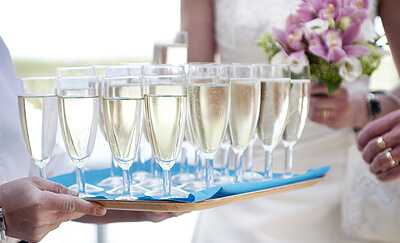
The history of the toast began way back in Ancient Greece when it was used as a salute to the gods.
The origins of the wedding toast are a little harder to find. There is a suggestion that it also occurred in Greece in the 6th Century B.C. This controversial theory says that the practice began between families of warring tribes. When the war ended in a truce, the children of the leaders would marry one another to cement an alliance. Everyone had to drink wine from the same pitcher, and the host (father of the bride) had to take the first drink. This is because the ancients had a nasty habit of poisoning enemies!
We can only assume that some form of wedding toast was practiced by the Celts and Christians either in concert with or instead of, an Irish wedding blessing. The term ‘toast’ is attributed to Shakespeare as it first appears in the English lexicon in his play The Merry Wives of Windsor. The scene in question sees the character Falstaff ask for wine and then proceeds to place a piece of toast in it. The purpose of the toast was to soak up some of the wine’s acidity, and it also made stale bread edible.
By the 18th century, Toastmasters arrived on the scene because the practice had exploded in popularity. Their role was to ensure people didn’t overdo it; toasting everyone in the room gave people the opportunity to get exceedingly drunk.
By the way, if you are the unicorn in the room that doesn’t drink at an Irish wedding, please note that toasting with water, tea or coffee is considered inappropriate behaviour.
Final Words
An Irish wedding blessing is a beautiful thing to hear at any ceremony. We have only focused on two of the many options available. We would encourage you to investigate other blessings to find one that marks the occasion in the best possible manner. It is an integral part of a great toast so do your research, calm those nerves and deliver your blessing with passion and feeling.

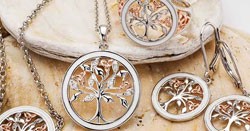
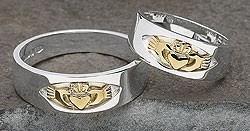
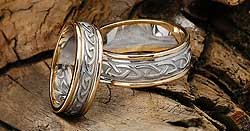
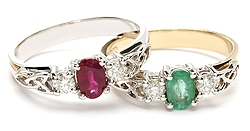
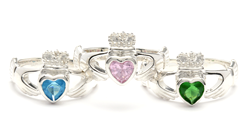
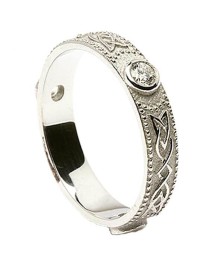 Celtic Diamond Wedding Ring
Celtic Diamond Wedding Ring 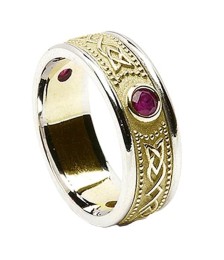 Celtic Diamond Ring with Trim
Celtic Diamond Ring with Trim 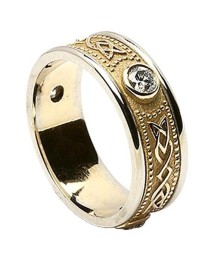 Celtic Diamond Ring with Trim
Celtic Diamond Ring with Trim 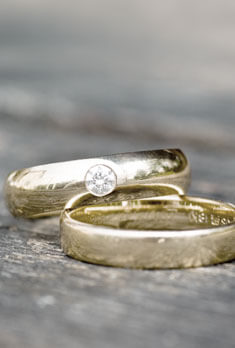
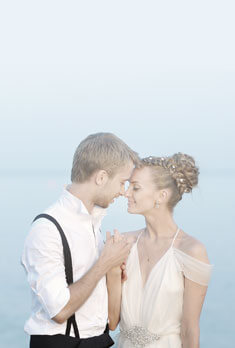
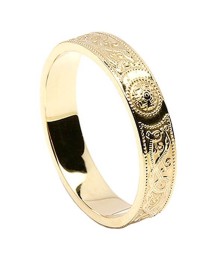 Irish Wedding Ring
Irish Wedding Ring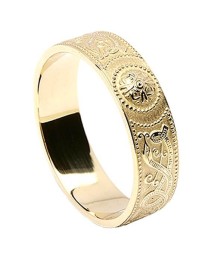 Mens Irish Wedding Ring
Mens Irish Wedding Ring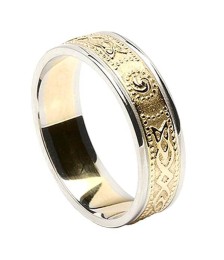 Narrow Irish Ring with Trim
Narrow Irish Ring with Trim